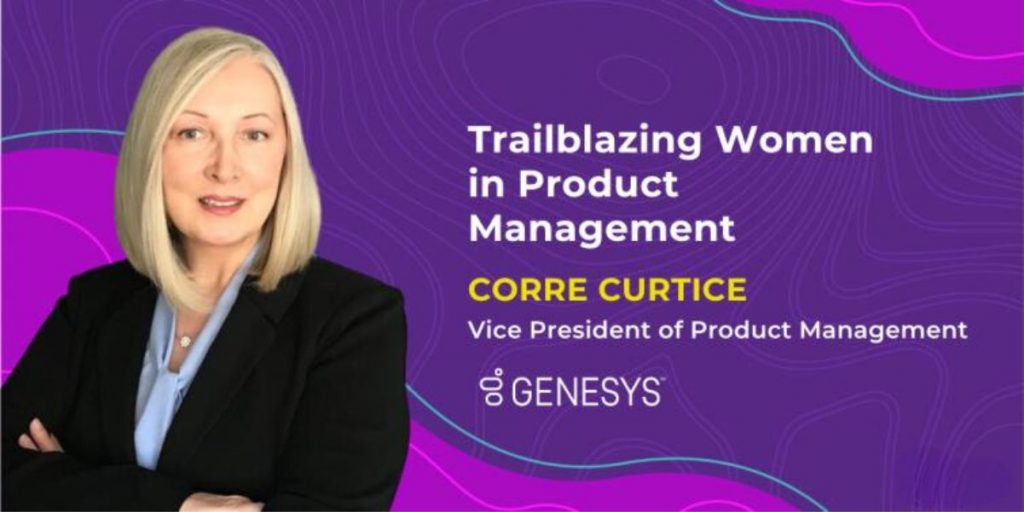
For our next installment of our Women in Product Management Series, I interviewed Corre Curtice, Vice President of Product Management at Genesys.
My passion and curiosity really made it a natural evolution from developing the product to managing the product.
Nicole: Corre, thank you for participating in our series and sharing your insights into Product Management.
Corre: My pleasure, thanks for inviting me.
Let’s get started with my favorite question, which is about your origin story. What led you to Product Management?
After I graduated with a degree in Economics, and a minor in Computer Science, I began my career as a product developer specifically in financial investment products, like annuities, trusts and bonds. I loved solving problems with technology, which is what drew me to computer science in the first place. I was passionate about it, and I excelled at it. Over time, I became more interested in the entire product, beyond the product development. I wanted to understand the customer experience, from how they first became aware of the product through purchase and adoption. I was curious to learn more about what the customer was feeling while using the product. At the same time, I became very focused on the business of my products. How much are we investing? What was the expected return on investment? What was the expected revenue? How much margin were we hoping to make? How was it performing in the market? What was our market share? My passion and curiosity really made it a natural evolution from developing the product to managing the product. I love being responsible for the whole product from vision through to launch and being responsible for the P&L.
Now you have had a long history in Product Management with a very intentional career trajectory. Tell me what are some lessons you’ve learned along your journey in Product Management.
I am constantly learning. One of my biggest lessons was to be open to new ideas and new techniques. When you’ve been in the business a long time, you’ve done a lot of things. You may assume you know the way to move forward. It’s important to remember to be open to other ideas, even ideas that seem really farfetched. Those are some of the most fruitful ideas.
Another big lesson for me was to not be too far ahead of the market. Early on, I launched a collaboration and communication product that the market was just not ready for. There wasn’t enough internal support to invest in creating a new market or to wait for the market to catch up. We ended up retiring the product and disbanding the team. Fast forward to today, and now these products are ubiquitous in the market, but 18 years ago people were not ready to think about communicating in this way. My big lesson was to be very clear about your target market and the customer’s readiness and willingness to spend money on your product.
It’s important to remember to be open to other ideas, even ideas that seem really farfetched. Those are some of the most fruitful ideas.
Those are great lessons. I love the anecdote too, the war story of what could have been. As long as you are learning along the way, that is what’s important. After learning so much through Product Management, what is it that you like most about it?
I really love the early stages of Product Management. I love understanding the market, the customer needs, and the technology trends, and then bringing that all together and creating the product vision. This is where I feel the most inspired. As I mentioned earlier, I also love thinking about the financial aspects of my product. I like putting together the financial business case—thinking about the market, our expectations for customer ramp, expected bookings, and ARR projections. A really well thought out business case along with that product vision is what makes me really happy. That’s what I like most about Product Management.
Product Management is so strategic, I’m sure it’s really satisfying to see that all come together. On the flip side, what do you find most challenging about Product Management?
The most challenging aspect of Product Management for me is maintaining internal alignment in the face of conflicting feedback. You will often get one type of feedback from your customer community, conflicting feedback from your sales community, and sometimes requests from your executive team might not align either. It’s challenging to bring all that feedback together, and to keep all the internal stakeholders aligned to your vision for the product. That internal alignment is so important because if the market wants or needs a new capability you want your sales team to feel positive and motivated to position it, and your executives to be ready to invest in it.
That sounds challenging. And your role is pivotal in bringing that all-important alignment together. It’s the challenge but, back to your point about what you love about Product Management, it is also critical in seeing that product vision and the business case come together.
Absolutely. When you can get that alignment and you get everybody in support of that product vision, that’s the magic ingredient for a successful product.
A really well thought out business case along with that product vision is what makes me really happy. That’s what I like most about Product Management.
Now let’s talk about your team in order to help our readers who are looking to advance their career. What do you look for when you are hiring Product Managers for your team?
I like to find people with different points of view. It’s important for people to have varying backgrounds when they come together to create, collaborate, and innovate. I really look for curiosity, the desire to learn about a market, the technology trends that might influence that market, and about customers’ problems and opportunities. I also look for somebody who has business sense. They need to understand if a solution translates into something that can be monetized. They also need to understand different commercial models, different partnership models and have general financial acumen. They need to be able to articulate what they’re expecting from a pricing model perspective as well as general revenue and margin on their products. Communication is important to translate complex, ambiguous, ideas and information into something that’s clear for the team. I don’t believe they have to be a technical expert, but they do need to be interested in technology and how technology can support customers through their business processes.
I think that’s an important point about technology. If someone doesn’t have a background in technology, they shouldn’t feel disqualified from pursuing Product Management. It’s good to hear that they don’t have to be an expert or have that depth of experience, as long as the interest is there.
Absolutely. You don’t need to be the technologist on the team. That’s why you have an entire product development team with technical architects. But you absolutely need to be interested in technology.
I think that’s great advice because that’s especially a concern I hear from women. Do you have any other advice for women who are considering Product Management as a career?
I recommend learning about finance so you can represent your products’ contributions to the company. Learn about marketing so you can better articulate to your marketing partners how you want to position your product in the market. Nobody knows that product better than you do, so you need to understand how to position it. Learn about selling so that you understand how to formulate your pricing and your commercial models so the sales team understands, and the customers will be willing to adopt your product. Understanding selling also helps you see how your product will fit into the portfolio of products that the sales team is trying to sell. Some products, because of their commercial or pricing model, might be harder for the sales team to position because of how it impacts their commission.
My final advice to women is to skip the impostor syndrome and have confidence. With confidence you can get good at storytelling and persuading people, and you’ll spend a lot of time doing that as a product leader.
With confidence you can get good at storytelling and persuading people, and you’ll spend a lot of time doing that as a product leader.
I think women, more so than men, really struggle with negative self-talk.
I sometimes still struggle with this. I used to grapple with this challenge, particularly when it came to public speaking. The fear of freezing in front of a large audience used to dominate my thoughts – a classic saboteur moment. The internal dialogue echoed, “I’m going to be in front of 200 people, and I’m going to freeze. I won’t be able to say anything.” However, I intervened allowing my sage to create a self-assuring reminder that I had never experienced such a freeze before. My intervention assured me that I was well-prepared, I knew the material inside out, and I had synthesized it extensively. While the saboteur continued to cast doubts on my confidence, my sage offered a different perspective. I allow the sage to guide me, enabling me to take both quantitative and qualitative risks.
A very important takeaway is even in failure, we need to recognize the importance of not being overly harsh on ourselves. Instead, embrace the opportunity for personal growth and maturation, as we often neglect this aspect of our development journey.


